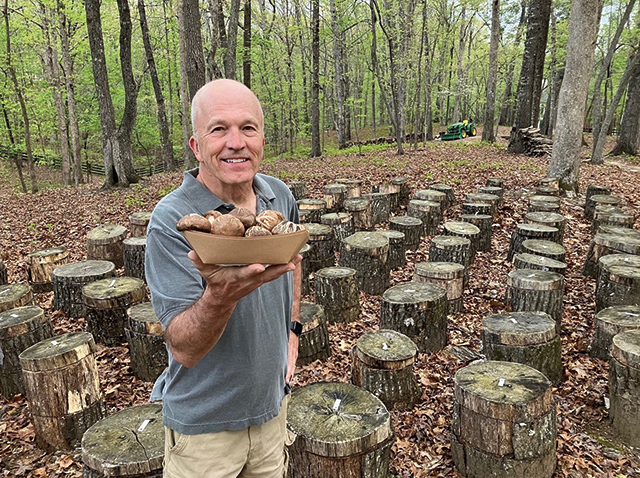Jeff Dufresne ’78
 DEGREE:
DEGREE:
B.A. in economics
JOB TITLE:
Mushroom farmer; former real estate developer, executive director of Urban Land Institute
FAVORITE TRINITY MEMORY:
One of my favorite Trinity memories was being editor-in-chief of The Trinity Tripod. I was proud to be sitting at the same desk once occupied by political commentator George Will ’62, who had edited the Tripod long before me. My staff and I covered stories for the campus newspaper ranging from Trinity crew winning the Henley in England in 1976, the opening of the Rathskeller in Mather Hall, and the never-ending debate about Greek life at Trinity. Personally, I have fond memories of my time at the Hall.
What did you do in the real estate field?
After Trinity and business school at Columbia, I married my soulmate and headed for Atlanta in pursuit of a career in commercial real estate development. I worked with institutional investors and pension funds on real estate development and redevelopment projects primarily in Atlanta, Denver, Miami, and Washington, D.C. I also served as executive director of the Urban Land Institute (ULI), which is a research and education think tank dedicated to providing leadership in the responsible use of land. Over time, I’ve focused on real estate “placemaking,” which is the act of transforming underutilized property into economically vibrant space for the betterment of both the property owner and the surrounding community.
How did your time at Trinity prepare you for the work in real estate?
Majoring in economics taught me how to use analytical reasoning to study behavioral patterns, policy problems, and business practices. My architectural courses taught me about design, drafting, and three-dimensional thinking. My studio arts classes included a variety of visual art mediums where I was encouraged to express myself and to develop creative solutions. Studying art history equipped me with an understanding of the built environment as well as artistic approaches to the study of monuments and cities. In total, my Trinity experience and contacts made at the time have served me well in my professional endeavors.
What was the most memorable course you took at Trinity?
During my junior year, I took “Architectural Drawing and Design” taught by Professor Dave Woodard. The course challenged me to design with a purpose. I recall many hours laboring over my drafting board trying to design the perfect pocket park or town house in Frog Hollow near the Trinity campus. I also was the teacher’s assistant for that course, which gave me a decent foundation in architectural design that has been helpful throughout my real estate career. For example, I served on the Design Review Board of Milton, which is a newly established city within metropolitan Atlanta and also is where I live.
Did you have a professor who was particularly influential?
That would be Professor Andy Gold. While I never took any of his courses, Andy was my senior adviser, and I recall our chats during my senior year about the complex interaction between humans and the built environment. We talked about how we could transform the “insurance capital of the world” into a more economically, socially, and racially integrated city. Dr. Gold definitely sparked my interest in urban development and land use.
What led you to take up mushroom farming in your retirement?
I have always been intrigued by mushrooms. As a child, I’d throw puffballs [variety of mushroom] at my brother. On the family dinner table, we’d often feast on white button mushrooms or other edible fungi. So now in my third trimester of life, I’ve become a bona fide mushroom farmer. Specifically, I harvest and sell edible mushrooms like shiitake, oyster, and lion’s mane to local farm-to-table restaurants and directly to consumers. I was attracted to this encore career largely due to the health benefits from eating mushrooms, which include promoting heart health, lowering cancer risk, improving memory, and much more.
What do you enjoy most about farming?
I enjoy mushroom farming because it’s environmentally friendly, and it brings me closer to nature. I grow mushrooms on hardwood logs such as oak, maple, and beech trees gathered from my farm. Mushrooms generally fruit between spring and fall, and as mycologists say, “When it rains, it spores.” Mushroom farming also can be quite profitable considering the start-up cost is low and capital investment is minimal. Fungiculture can be highly entrepreneurial, and as a result, I am branching out into offering value-added products like mushroom jerkies, soups, and chips.
What are the biggest challenges you face?
Controlling moisture, shade, and pests, and most of all, having patience.
